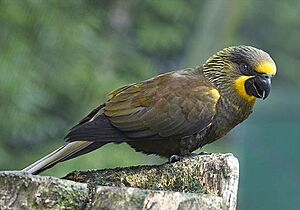Brown lory facts for kids
Quick facts for kids Brown lory |
|
|---|---|
 |
|
| Conservation status | |
| Scientific classification |
|
| Kingdom: | Animalia |
| Phylum: | Chordata |
| Class: | Aves |
| Order: | Psittaciformes |
| Family: | Psittaculidae |
| Genus: | Chalcopsitta |
| Species: |
C. duivenbodei
|
| Binomial name | |
| Chalcopsitta duivenbodei Dubois, 1884
|
|
| Script error: The function "autoWithCaption" does not exist. | |
Script error: No such module "Check for conflicting parameters".
The brown lory (Chalcopsitta duivenbodei) is a type of parrot. It is also known as Duyvenbode's lory. This colorful bird lives in northern New Guinea. It belongs to the Psittaculidae family, which includes many parrot species.
Contents
About the Brown Lory
The brown lory is one of three species in its genus, Chalcopsitta. A genus is a group of closely related animals or plants. The name Chalcopsitta comes from two ancient words. Khalkos is a Greek word meaning "bronze." Psitta is a Modern Latin word meaning "parrot."
The second part of its scientific name, duivenbodei, honors a Dutch merchant. His name was Maarten Dirk van Renesse van Duivenbode.
What Does It Look Like?
The brown lory has a unique look. It has a black beak. Its face is streaked with yellow. The bird's tail is white. Most of its feathers are a dark brown color.
Life and Habits
How Brown Lories Breed
Brown lories usually breed in April. When they are in captivity, female lories lay about two eggs. The eggs hatch after about 24 days. The baby birds, called nestlings, stay in the nest for almost 11 weeks.
Where They Live and How They Are Protected
Brown Lory Habitat
The brown lory lives in northern New Guinea. It prefers warm, wet lowland forests. These forests are usually found at low elevations. They are typically no higher than 150 meters (492 feet) above sea level.
Conservation Status
The IUCN lists the brown lory as a "least-concern" species. This means it is not currently in danger of extinction. However, experts believe its population is slowly shrinking. The total number of brown lories is estimated to be around 50,000 birds.
 | John T. Biggers |
 | Thomas Blackshear |
 | Mark Bradford |
 | Beverly Buchanan |


